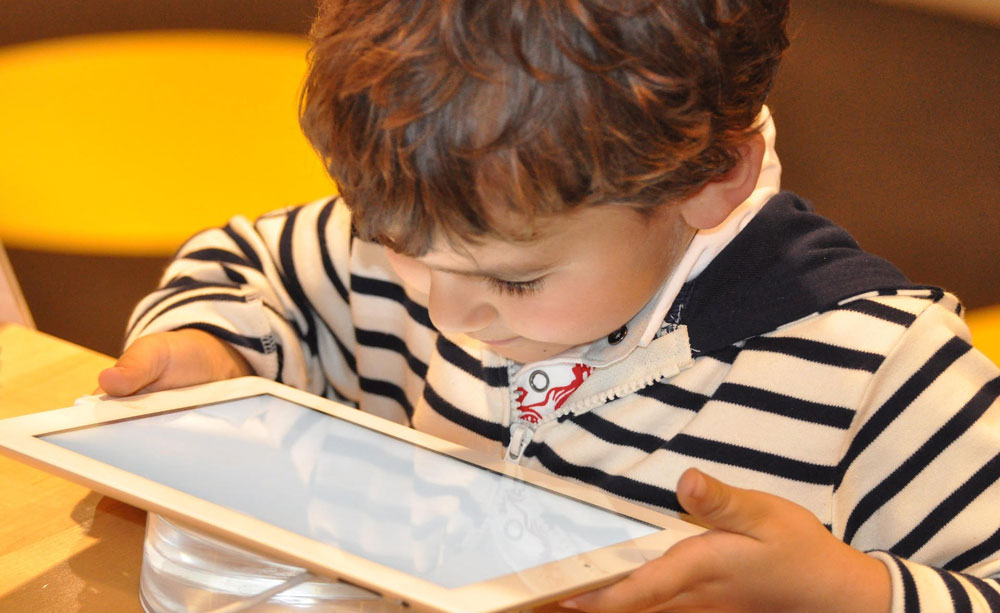The digital age has given new generations of parents something extra to worry about: How much screen time is too much? Physicians, teachers and psychologists generally agree that spending inordinate amounts of time immersed in computers, smartphones or social media can negatively impact a child’s developing mind and body. A screen time study published recently in JAMA Pediatrics found a link between excessive screen time and later development milestones. Other studies have associated digital overuse with teen depression, and the American Academy of Pediatrics has issued guidelines suggesting daily limits on screen time for different age groups.
“It’s the responsibility of the parents to get control of this and guide their children, from a young age, on the positives and negatives of screen time,” says Christine Kyriakakos Martin (youvegotthisparenting.com), an early education expert and author of You’ve Got This! Keys To Effective Parenting For The Early Years. “Parents can often think it’s acceptable for a young child to spend a couple hours with an iPad, but the type of education the iPad game is providing isn’t always the type of learning most needed at that stage.” Martin has suggestions for how parents can manage screen time and decrease a child’s risk for screen-related health or developmental problems:
- Distinguish screen time from play time. Play is a fundamental learning tool for young children, but parents, Martin says, should not think of screens as toys for play time. “When screen time is limited and separated from other types of play, parents show their children the importance of setting boundaries, using their imaginations, and being active.” When children are ready for school they are not going to encounter screens around every corner that they can play on, so distancing them from it now can help them ease into that school mindset.
- Get involved. Parents who engage with their children about on-screen activities can help them increase their communication skills and teach them how to navigate digital media. “Parents can talk with their children about the videos they watch and games they play like they would discuss characters and plotlines in a book,” Martin says. “When there is parental engagement like this, a child’s vocabulary and literacy skills develop and family communication gets stronger.”
- Make mealtimes screen-free. “Eliminate screens from the meal table, including when you’re out at a restaurant,” Martin says. “While it can be tempting to pack the iPads to have some adult conversation while you’re out to eat, doing this doesn’t teach your children about manners, properly engaging in conversation, or being mindful of other patrons.”
- Set a good example. It will be harder for a child to disengage from screens if his or her parents are consistently looking down at their own phones or tablets. “Remember your children learn from your example,” Martin says. “Spending time with their parents, learning through pla is what young children need and want.”














 Deering Estate
Deering Estate
 Massage Envy South Miami
Massage Envy South Miami
 Calla Blow Dry
Calla Blow Dry
 My Derma Clinic
My Derma Clinic
 Sushi Maki
Sushi Maki
 Sports Grill
Sports Grill
 The Healthy Kitchen
The Healthy Kitchen
 Golden Rule Seafood
Golden Rule Seafood
 Malanga Cuban Café
Malanga Cuban Café

 Kathleen Ballard
Kathleen Ballard
 Panter, Panter & Sampedro
Panter, Panter & Sampedro
 Vintage Liquors
Vintage Liquors
 The Dog from Ipanema
The Dog from Ipanema
 Rubinstein Family Chiropractic
Rubinstein Family Chiropractic
 Your Pet’s Best
Your Pet’s Best
 Indigo Republic
Indigo Republic




 ATR Luxury Homes
ATR Luxury Homes


 2112 Design Studio
2112 Design Studio
 Hamilton Fox & Company
Hamilton Fox & Company
 Creative Design Services
Creative Design Services
 Best Pest Professionals
Best Pest Professionals
 HD Tree Services
HD Tree Services
 Trinity Air Conditioning Company
Trinity Air Conditioning Company
 Cisca Construction & Development
Cisca Construction & Development
 Mosquito Joe
Mosquito Joe
 Cutler Bay Solar Solutions
Cutler Bay Solar Solutions


 Miami Royal Ballet & Dance
Miami Royal Ballet & Dance
 Christopher Columbus
Christopher Columbus
 Pineview Preschools
Pineview Preschools
 Westminster
Westminster
 Carrollton
Carrollton
 Lil’ Jungle
Lil’ Jungle
 Frost Science Museum
Frost Science Museum
 Palmer Trinity School
Palmer Trinity School
 South Florida Music
South Florida Music
 Pinecrest Orthodontics
Pinecrest Orthodontics
 Dr. Bob Pediatric Dentist
Dr. Bob Pediatric Dentist
 d.pediatrics
d.pediatrics
 South Miami Women’s Health
South Miami Women’s Health

 The Spot Barbershop
The Spot Barbershop
 My Derma Clinic
My Derma Clinic




 Miami Dance Project
Miami Dance Project

 Rubinstein Family Chiropractic
Rubinstein Family Chiropractic
 Indigo Republic
Indigo Republic

 Safes Universe
Safes Universe
 Vintage Liquors
Vintage Liquors
 Evenings Delight
Evenings Delight





 Atchana’s Homegrown Thai
Atchana’s Homegrown Thai
 Baptist Health South Florida
Baptist Health South Florida

 Laser Eye Center of Miami
Laser Eye Center of Miami
 Visiting Angels
Visiting Angels
 OpusCare of South Florida
OpusCare of South Florida

 Your Pet’s Best
Your Pet’s Best





 HD Tree Services
HD Tree Services
 Hamilton Fox & Company
Hamilton Fox & Company


 Creative Design Services
Creative Design Services